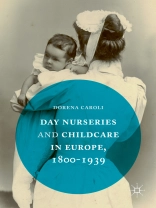This book traces the birth and evolution of the crèche in France, England, Germany, Russia and Italy from the mid-nineteenth century to the eve of the Second World War, in an attempt to understand from a transnational viewpoint the history of an institution for very young children that was very different from what we know today. These institutions had the two-fold goal of combatting the two phenomena that had for centuries characterised the history of infancy – infant mortality and the abandonment of babies.
Drawing on a wealth of printed sources and in the light of the most recent and authoritative historical investigations, Dorena Caroli discusses the origins of the first crèche, established in Paris in 1844 by Firmin Marbeau, going on to compare and contrast the reception of the French model of care and assistance for babies and infants in a number of different European countries – England, Germany, Russia and Italy.
This book fills a significantlacuna in the studies of infant history and the educational institutions designed for infants, providing a clear and broad picture not only of the practices followed but also of the evolution of “puericulture” and medical theories about very young children held in Europe in the nineteenth and twentieth centuries. It represents not only a valuable contribution to the history of these institutions but also a useful manual for students in the field of infant care.
Table of Content
Chapter 1. The Birth and Spread of Crèches in France between The Second Republic and The Second World War.- Chapter 2. The Spread of Day Nurseries in England.- Chapter 3. Dissemination of Crèches in Germany by the Prussian Empire to National Socialism.- Chapter 4. Dissemination of Crèches in Czarist and Soviet Russia.- Chapter 5. The Rise of Crèches from The Restoration to the Unification of Italy.- Chapter 6. The Development of the Crèches by Crispi’s Law until Fascism.
About the author
Dorena Caroli is an associate professor at the University of Macerata, Italy.












